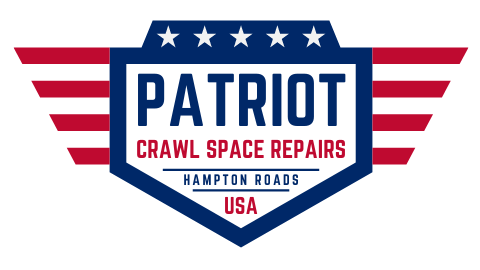The Crawl Space Blog
Expert information and advice on everything crawl space and termite & moisture related.
Termite & Moisture Inspection Myths
Watch The Video Or Read The Article Below!
Full Article -----
The Issue At Hand:
When it comes to home sales and purchases, the crawl space is a major source of unforeseen issues. As a Class-A crawl space repair contractor, and licensed pesticide company, we see several common myths and misunderstandings that result in, real estate agents, home buyers and sellers, being misinformed when it comes to moisture issues and repairs under homes. For the purpose of this post, we are just going to call the WDI & Moisture Inspections "termite inspections".
Myth #1: The termite & moisture inspection overrides the home inspection when it comes to the crawl space.
This is 100% incorrect. When conducting a WDI & Moisture Inspection, commonly referred to as a "termite & moisture inspection", there are two forms that are filled out. One form asks a few questions about wood destroying insects, and one form asks about fungus or moisture conditions in the crawl space at the time of inspection, that's it!
The termite inspector is not responsible for determining what has to be done about any issues, and cannot mandate repairs; the inspector simply fills out the forms honestly. The inspector may submit a quote for treatment or repairs, but they cannot mandate them. Whether treatments or repairs are conducted depends on the agreements between the buyer and seller. The termite inspector is acting as a insect and fungus evaluator, not a building expert.
The inspector that is qualified to do a comprehensive inspection of the crawl space is the home inspector. They are trained on how multiple factors influence the health and longevity of the structure, and can point out any issues that should be further evaluated by a contractor. If you are a buyer, or a real estate agent representing the buyer, the home inspection contingency removal or PICRA, is your #1 chance and means of protection in assuring that any issues in the crawl space are addressed. Do not rely on the termite and moisture inspection.
Myth #2: If there are no issues at the time of the termite & moisture inspection, the crawl space is fine.
The main issue here has to do with timing. If your inspection happens between November and May, there could be major problems that just aren't seen at the time of inspection. You see, moisture in the crawl space occurs from June to October for the most part, and the space gets dried out in the winter. The termite and moisture inspection only sites what is seen at the time of inspection.
As a rule of thumb, if a home has a vented foundation, and there is duct-work in the crawl space, the buyers should consider closing the space off and installing a dehumidifier. This is just simple science. When hot air enters the crawl space in the Summer, that hot air hits cool surfaces and condensation occurs. A vapor barrier does not prevent this. The condensation leads to mold and fungus, which eventually leads to wood rot. This is almost a guarantee if the home is in Southeast Virginia. I'm not saying the seller has to pay for this, but the buyer should probably be educated on it.
In addition, it may not have rained in a while when the inspection occurs. The termite and moisture inspector is only evaluating mood fungus and moisture, but drainage is a major factor in crawl space and foundation health. If the home inspection report indicates water marks on the foundation walls, and the crawl space is below the grade of the yard, a French drain and sump pump could be needed. These water marks indicate that the space flood when it rains, even though it may be dry at the time of inspection.
Myth #3: Termite and moisture inspectors are licensed and qualified to make repairs and recommendations.
In some cases, the termite inspector may also be a licensed building contractor, but in most cases they are not. In addition, if they are a larger company, the person doing the inspection may be a licensed pesticide applicator, but is definitely not a building contractor, even though the owner of the company may have some form of contractor license.
While they are typically experienced in pointing out wood damage, they are typically not structural repair experts, moisture and encapsulation experts, or mold remediation experts. This role would typically be better served by a Class-A building contractor that specialized in crawl space structural and moisture issues.
In many cases, the termite inspection companies will quote structural repairs, while not having the proper licensing, or the proper insurance. Pesticide insurance, and insurance for structural repairs in confined spaces are two totally separate things. If someone working under the home is injured, this could jeopardize the homeowners investment if the proper insurance is not in place.
In many cases, unlicensed termite inspectors quote structural repairs, and then sub that work out to other unlicensed or under-insured work crews to do the work. Without naming names, I will tell you that most of the popular termite inspectors are breaking these laws and putting homeowners at major legal risk.
Myth #4: Fungus treatments remove and stop mold & fungus.
First of all, fungus treatments do not remove mold and fungus; they kill surface fungus, and prevent growth for a short time. If the source of moisture persists, mold and fungus will start to grow again within months in some cases.
To actually remove the mold and fungal growth a wood cleaning needs to be performed by a qualified contractor. We use a high concentrate peroxide solution formulated for wood cleaning to remove organic growth.
To stop future growth, the foundation vents need to be sealed, a vapor barrier installed, and a dehumidifier installed. In some cases, if there is water intrusion at the foundation wall, a sump pump needs to be installed.
Fungus treatments are simply a short term fix to get a deal to closing, They do not remove mold and fungus or prevent future growth if moisture issues are still present in the crawl space.
Myth #5: Inspectors and contractors blow crawl space issues out of proportion.
The opposite is actually true here. A lot of inspectors are injured or lazy, and don't do a detailed inspection. Some don't want to "rock the boat" and just want to sell a treatment. Our area is very humid, and there is actually no need to create crawl space issues; they're already there.
The truth is, if a crawl space foundation wall is vented to the outside, there will be moisture issues; there will be mold & fungus, and there will eventually be structural damage. This is a guarantee. The only way to stop this is to control the humidity in the crawl space.
Again, this is not to say that sellers should pay for this, but buyers should be properly informed.
Myth #6: Re-inspections and pre-listing inspections are a waste of time.
Half of the work we do is going behind another company that did the work incorrectly or not at all. We see this with some of the largest termite and foundation repair companies. The larger they are the worse the work is in our experience. Some do a great job, but most do not. Crawl space repairs are very hard work, require a lot of building knowledge, and steps get skipped.
Always, always, always, get crawl space repairs inspected by a third party, no matter who is doing the work. This will help your contractors as well, because if their employees are skipping steps or doing things incorrectly, they want to know.
In addition, pre-listing inspections give a seller the chance to address issues in the most economical way possible, without a buyer dictating what is done and by whom. We offer free pre-listing inspections with no sales pitch or pressure. They are a good idea if a home has a crawl space.
Conclusion:
Termite & moisture Inspections are very simple inspections. They are not comprehensive; the inspectors are not building experts, and they do not dictate what repairs are made or not made; this just isn't their job. If you are buying a home, or are an agent representing the buyer, lean on the home inspector and the home inspection report to determine if you need a crawl space company to evaluate things further.
If you see issues on the home inspection report, ask the home inspector what they think about it, and if they recommend evaluation. And if you need a comprehensive crawl space evaluation, give us a call at (757) 210-6043.
Robbie and April McCarty
Patriot Crawl Space Repairs

